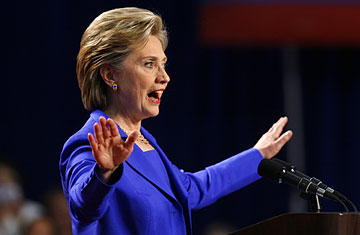
Senator Hillary Clinton (D-NY) speaks to supporters at her South Dakota and Montana presidential primary election night rally in New York on June 3
The last time a member of the Clinton family gave a concession speech, it was 1980. The world had not yet heard the name Indiana Jones. Barack Obama was a teenager. Rookie Arkansas governor Bill Clinton, defeated for reelection, choked out the words as his wife stood grimly by.
It doesn't come naturally, in other words. So anyone looking to Hillary Clinton for a comfortable acknowledgment of defeat was hunting for teacups at the hardware store.
She's staying in—at least long enough to find out how many supporters will visit her website, e-mail encouragement, and click to help retire her massive campaign debt at www.hillaryclinton.com.
It was quite a speech. Obama's narrow but apparently decisive lead at the end of the primary season is merely a figment of the "pundits and naysayers," Sen. Clinton told a rally in her adoptive home of New York City. Jeers reverberated. In truth, she assured them, she won. "Nearly 18 million of you cast your votes for our campaign, carrying the popular vote with more votes than any primary candidate in history," Clinton declared. The swing states that will determine the general election belong to her. It's a debatable point—but not, ultimately, germane, because the nomination is about delegates, and Clinton made the strategic decision to give up a lot of caucus-state delegates without much of a fight. Say nay or say yea—the fact is, Obama buried her in the places she neglected to contest seriously.
But the crowd had come to the rally at the Baruch College gymnasium in lower Manhattan to hear a victory story, not a valediction. They loved her as she strode in to the strains of "Ain't No Mountain High Enough," and loved her as she departed to Tina Turner's "Simply the Best." Her speech was a roller-coaster ride and they hung on every minute.
Again and again, they grumbled as Clinton appeared to reach a classic throw-in-the-towel moment. She called on her fans to "take a moment tonight to recognize [Obama] and his supporters for all they have accomplished"—uh-oh. But then she pivoted to avoid saying exactly what they had pulled off. Later she said: "In the end, while this primary was long, I am so proud that we stayed the course together," and it sounded like setting up a farewell.
But it was not to be.
The greatest cliffhanger — a big intake of breath before the loop-the-loop—was her line: "Where do we go from here?" Surrender? Never! She sent "the 18 million people who voted for me" to her website, where they could offer advice and much-needed money. While they click vigorously, she will be consulting with "party leaders" to learn what they think she should do—this, Clinton said, on a day when one of her staunch supporters, Sen. Dianne Feinstein of California, declared the race over and uncommitted super delegates scrambled to endorse Obama.
Inside the room, people were invigorated, chanting "Denver! Denver!" as if spoiling for a floor fight at the Democratic convention in Colorado. But they were also realistic. As thrilling as it was to hear Clinton say once more that only she has the heft in swing states to beat Republican John McCain, Topic A was the vice-presidency.
"Something isn't working or hasn't been working" with Obama and Latino voters, said Rep. Nydia Velasquez of New York. "So I think she would be able to help him in that regard." Songwriter Jennie Walker hit the same note: "I hope Obama picks her. Then I'll definitely vote for him."
But it was Lynn Forester de Rothschild, wife of Sir Evelyn de Rothschild and a fund raiser for Clinton, who best echoed the candidate's audacity of nope. "He needs to go to her hat in hand," she said of Obama and Clinton—where the guy who won is the guy with the hat. "He'll lose women, he'll lose Hispanics, he'll lose seniors and he'll lose that working community," she continued. "If Hillary's not there, I don't think they're going to relate to Barack Obama."
At one point in her speech, Clinton recalled all the times she has been written off in this campaign only to pull herself back into it. The first time was in New Hampshire. She spoke there of "finding my voice."
And it's true, her campaign has been a search for the right voice. She tried the voice of experience, the voice ready on Day One, the 3 a.m. voice, the voice of the workhorse (not the show horse), the voice of the fighter.
That turned out to be the one. Once she hit on that authentic theme, she began doing very, very well. History will note that Barack Obama won the nomination in February and spent the next four months trying not to let her take it back.
You can say she finished in second place. Numbers can say that. Party leaders can say that. Rules and delegates and pundits can say that. But after her speech—the concession that wasn't—it was Obama's voice on her voicemail at 11:06 p.m. Eastern time, congratulating her, not the other way around, and asking her to call him back.
